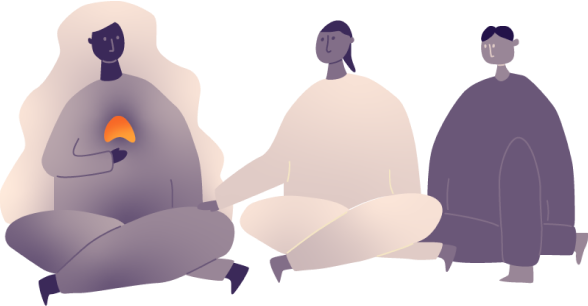Awhi is still in development, we'd love your feedback and suggestions. Let us know.
Early Intervention - How can I help my pre-schooler at home?
Early Intervention is a term for putting in place extra support for children with disabilities or developmental delays from the age of birth to five-years-old.
It can be a difficult time for the whole family, with visits to medical facilities, sleep deprivation, work disruptions as well as the inevitable confusion and worry.
But pre-school years are precious, both for you and your child, and it is important that this time for bonding, play and exploring the world together, does not take second place to attending to their medical and developmental needs.
A way to meet these two needs simultaneously is to use Early Intervention techniques at home through play and participation in ordinary family activities. Your child will have their extra support needs met by the people who love them the most, in the environment they feel most comfortable in – their home.
Internationally, parent-focused Early Intervention Plans are acknowledged as the most appropriate way for infants and toddlers to learn. So, although you will be guided by a team from your Early Intervention provider, they in turn will be guided by your unique knowledge of your child.
So what can I do?
- Own your role as the expert on your child’s needs, interests and goals, when developing an Early Intervention plan with Early Intervention Services (EIS), or with a Child Development Team from Te Whatu Ora.
- Maintaining a balanced family life, so that time is prioritised for play, family outings and relaxation, that the whole family can enjoy, will help everyone's stress levels.
- Remember that children are born with an innate desire to explore, learn and play. Use these opportunities to help your child develop. But try not to view it as a ‘therapy session’ – all children learn from their parents - you are just doing what comes naturally.
- Each child and each family is unique, so experiment with different early interventions strategies. Don’t hesitate to let your early intervention provider know that something isn’t working for you or your child.
- Participation is key - look for ways to include your child in daily routines and activities as much as they can. Adapt your home environment, if necessary, to maximise your child’s engagement. Being active and independent will improve their self-esteem and will accelerate their learning.
- Think about what activities outside of your home you would like early intervention to support and raise this with your Early Intervention Team.
- Keep track of the information you are receiving, and ask for clarification if you need it. You should have a designated Early Intervention coordinator, but if not, it is important to keep all the information together.
What areas of my child’s development will I be working on?
The big four in terms of early childhood development are language, movement, cognition and behaviour. Depending on what developmental delays or disability your child has, it is likely that a specialist in that area will advise you on ways you can help your child progress at home.
Again, you have the advantage in that you are deeply familiar with your child as a WHOLE child, rather than seeing them as someone who can be split into separate functions! And often there is an overlap of skills between these different areas of development, such as turn-taking, object permanence, copying, practicing.
Always keep in mind activities need to be appropriate to your child’s individual needs and abilities. For example, a child with sensory issues might be overwhelmed by loud music and bright lights.
Top tips for helping pre-schoolers learn:
- You are far more likely to ignite your child’s curiosity by letting them do things for themselves. Use hands-on assistance only as a final resort.
- Find the ‘just right’ challenge – that is, once your child has mastered a skill, see how you can make it just that little bit harder than what they are already able to do. It shouldn’t be so hard they get discouraged, or so easy that they learn nothing new.
- Use ‘Assistive Technology’ to help your child do things. These are often ordinary items you can buy at a grocery store, a hardware shop or an arts supplies outlet. For example, you might wrap a drum-stick in foam rubber to make it possible for your child to bang on a drum. At the other end of the scale are computers that help toddlers talk, for example or power chairs that help them move around.
- Observe your child closely and see what they enjoy doing most and how they stay on task. Then observe them doing other activities and the length of time they spend doing it. Always finish an activity when they show signs of restlessness and praise them for their efforts.
- Give your child choices – we all engage more readily with the activities we choose. But limit the number of choices to two or three, or they may become overwhelmed. You can increase the number of choices as the child gains in confidence.
- Encourage your child to look at books without supervision - they are more likely to become independent readers if they have been able to look at picture books at their own pace and on their own terms. Audio books that they can listen to are also a good option to promote self-directed learning.
- Use play such as dress-ups to develop fine motor skills – buttoning and unbuttoning, pulling up and pulling down, fastening and unfastening.
- Visual supports such as photos or pictures pinned to the wall, can help children remember tasks, schedules and sequences.
While Early Intervention is all about setting very young children on a positive course for learning and development as they grow, don’t forget to simply enjoy being with your child. Whatever they are able to achieve, now and in the future, children need the reassurance that their parents will love and care for them regardless.
For more on Early Intervention, check out other panui in this series on Awhi Nga Matua. You might also find the resources below useful, which include website, books and articles from the IHC Library. Or contact the IHC library direct to have a chat about what you need on 0800 442 442 or email: Librarian@ihc.org.nz.
Resources
Early childhood intervention without tears :
Early childhood intervention without tears :
"This essay describes an enhanced Team Around the Child (TAC)...
"This essay describes an...
Early Intervention Every Day! :
Early Intervention Every Day! :
"Effective early intervention doesn't stop when the provider leaves...
"Effective early...
CARA's kit for toddlers :
CARA's kit for toddlers :
"CARA's Kit stands for Creating Adaptations for Routines and...
"CARA's Kit stands for...
Early intervention practices around the world
Early intervention practices around the world
Describes effective early intervention practices at work in 13...
Describes effective early...
The early intervention guidebook for families and professionals :
The early intervention guidebook for...
"Shows what early intervention looks like when it is based on...
"Shows what early...
Group play interventions for children :
Group play interventions for children :
"Group play interventions are used to meet a broad range of...
"Group play interventions...
Early learning goals for children with special needs
Early learning goals for children with...
Provides suggestions for those working with children with...
Provides suggestions for...
Small steps forward :
Small steps forward :
"When young children are diagnosed with conditions such as Down's...
"When young children are...
Small steps forward
Small steps forward
"When young children are diagnosed with conditions such as Down's...
"When young children are...
DEC recommended practices :
DEC recommended practices :
"Guides the development and implementation of an effective early...
"Guides the development and...
Teaching individuals with developmental delays :
Teaching individuals with developmental...
Offers detailed descriptions of current programs and addresses the...
Offers detailed...
Working with families of young children with special needs
Working with families of young children...
"This user-friendly book presents research-based best practices for...
"This user-friendly book...
Inclusion in the early childhood classroom :
Inclusion in the early childhood classroom :
"In this engaging book, the authors share stories from their...
"In this engaging book, the...
Prevent-teach-reinforce for young children :
Prevent-teach-reinforce for young children :
"Now early childhood professionals have their own guide to the...
"Now early childhood...
Helping children to improve their gross motor skills :
Helping children to improve their gross...
"This guided curriculum offers a way to help children and young...
"This guided curriculum...
Helping children to improve their gross motor skills :
Helping children to improve their gross...
"This guided curriculum offers a way to help children and young...
"This guided curriculum...
Cerebral palsy in infancy: targeted activity to optimize early growth and development
Cerebral palsy in infancy: targeted...
"Cerebral Palsy in Infancy is a thought-provoking book which...
"Cerebral Palsy in Infancy...
Family-based practices
Family-based practices
"Addresses the topic of family-based practices describing specific...
"Addresses the topic of...
What is Early Intervention?
What is Early Intervention?
Early intervention means identifying and providing effective early...
Early intervention means...
The Power of Early Intervention :
The Power of Early Intervention :
Early intervention - tackling problems before they become more...
Early intervention -...
Early Intervention Services
Early Intervention Services
NZ Ministry of Education website explaining the Early Intervention...
NZ Ministry of Education...
Plunket Whanau Awhina
Plunket Whanau Awhina
"Plunket is a charity and Aotearoa New Zealand’s largest support...
"Plunket is a charity and...
Children’s Health, Starship, Te Whatu Ora /Te Toka Tumai Auckland
Children’s Health, Starship, Te Whatu Ora...
Information on children's health services at Te Whatu Ora Te Toka...
Information on children's...
Child Development Centre, Te Whatu Ora/ Waikato
Child Development Centre, Te Whatu Ora/...
Summary of services and contact information for the Waikato Child...
Summary of services and...
Child Health, Te Whatu Ora Health New Zealand/Lakes
Child Health, Te Whatu Ora Health New...
Brief overview of the service and submission forms for a referral.
Brief overview of the...
Child Development Service, Te Whatu Ora Health New Zealand/Southern
Child Development Service, Te Whatu Ora...
Contact information for the Child Development Service, Southland,...
Contact information for the...
Child Development Service, Te Whatu Ora Health New Zealand/Waitaha Canterbury
Child Development Service, Te Whatu Ora...
Child Development Service website, includes a description of the...
Child Development Service...
Community Child Health, Te Whatu Ora/Waitemata
Community Child Health, Te Whatu...
Overview of Community Child Health and the services provided,...
Overview of Community Child...
Child Development Service, Wellington Regional Children’s Hospital Te Whatu Ora/Capital, Coast and Hutt Valley
Child Development Service, Wellington...
Overview of the service, the professional staff on the team and...
Overview of the service,...
Child Development Service, Te Whatu Ora/Health New Zealand/MidCentral
Child Development Service, Te Whatu...
Brief explanation of the Child Development Service, the type of...
Brief explanation of the...
Whaikaha – Ministry of Disabled People
Whaikaha – Ministry of Disabled People
Brief description of Child Development Services and how to access...
Brief description of Child...
Foundations
Foundations
UK website Foundations, a result of the merger between What Works...
UK website Foundations, a...

Resources for kids
.jpg&w=128&q=75)
Meryl Richards
I’m Meryl Richards. What a pleasure it’s been to join the Awhi team. I get to spend my days researching information that supports me as a parent, and sometimes challenges me to rethink what I thought I knew. My hope is that it will be useful to you too. I live in Kapiti with my partner and two teenage boys, and spend as much time as possible in the surrounding bush and at the beach.
Was this resource helpful to you?


The Awhi Ngā Mātua team would like to thank Takai, the IHC Foundation and the Dines Family Charitable Trust for their generous contributions to our work. A huge thank you also to the IHC Programmes team, in particular the IHC Library which has worked so hard to make their remarkable collection available to us.




.jpg&w=3840&q=75)




